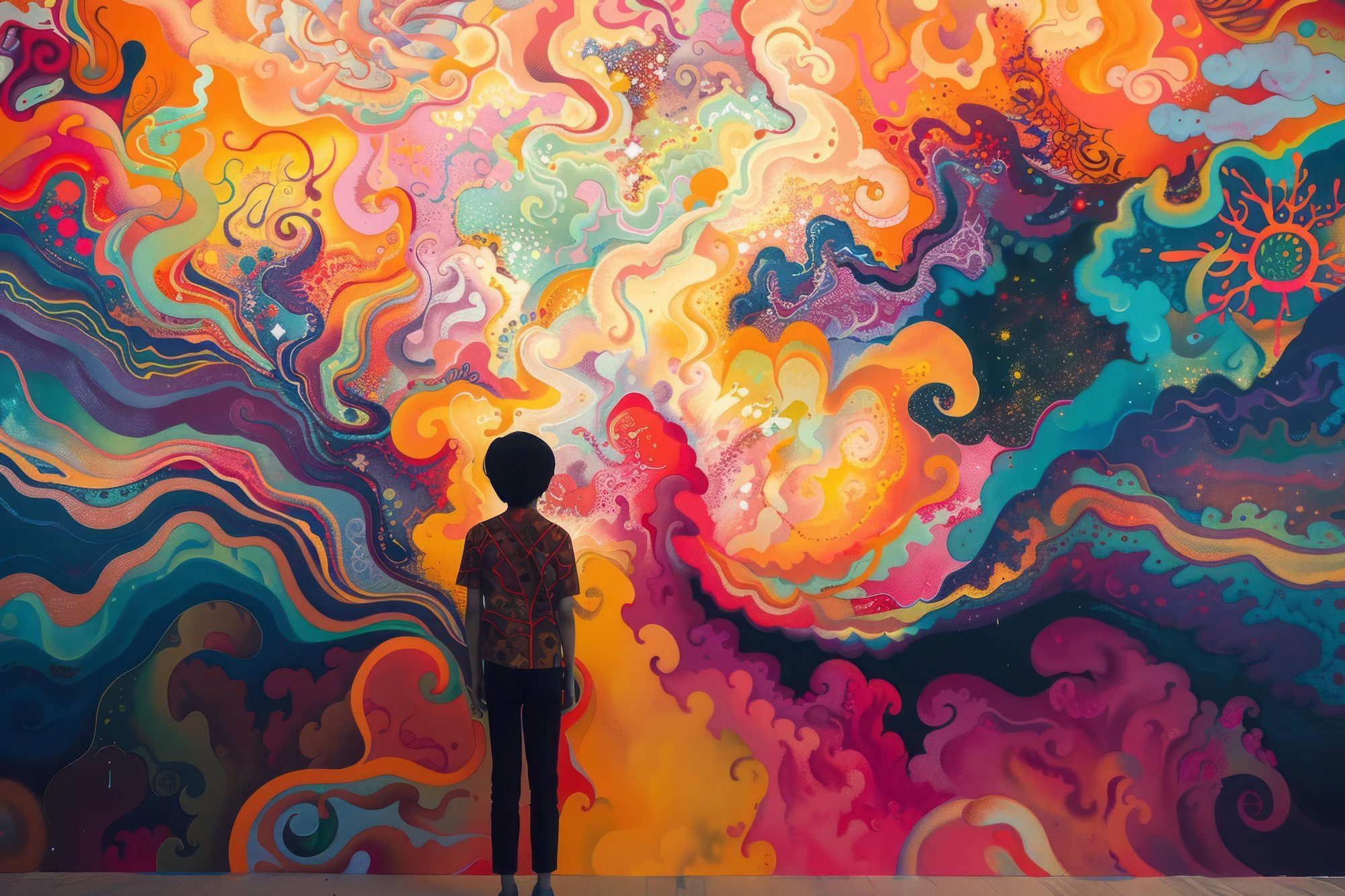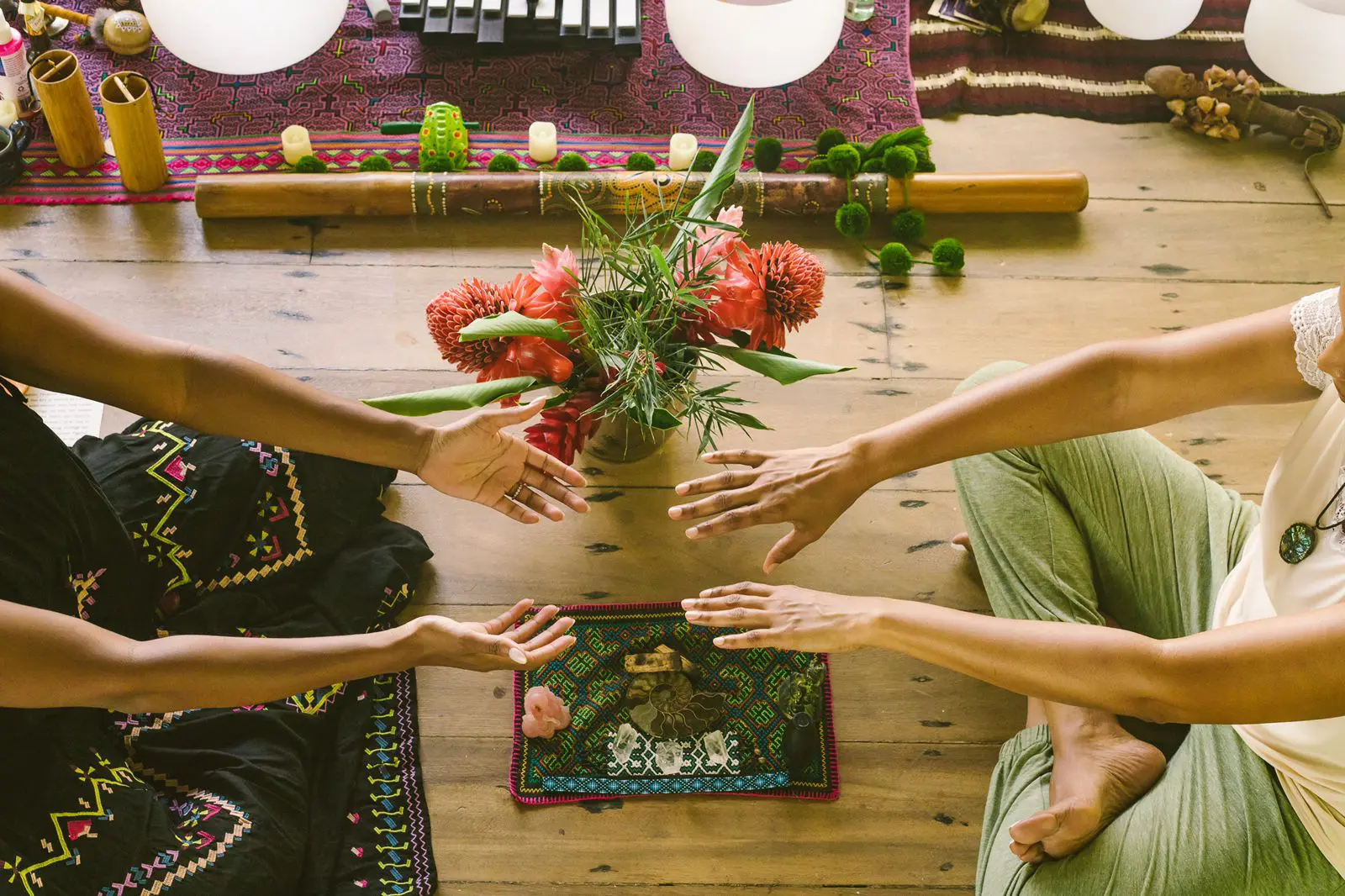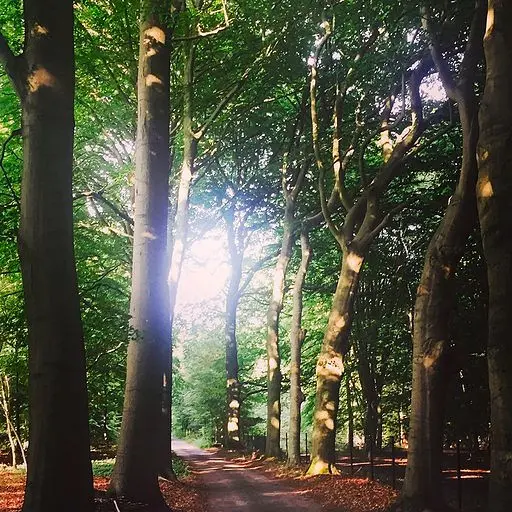
Psychedelics and Creativity
Psychedelic substances have a long and sacred history, from their ancient ceremonial use to the modern resurgence of contemporary research into their potential benefits. In the latest wave of this psychedelic renaissance, many researchers, scientists, and other interested individuals alike have begun to focus their attention on the relationship between these substances and creativity, specifically examining how the effects of psychedelics can boost creative ability and otherwise enhance creating thinking. Such findings are still a work in progress as research into psychedelics continues to develop.
This article explores the connection between a psychedelic experience and, as evidence suggests, their ability to unlock creativity.
Of particular interest in this article is a focus on the synergy between psychedelics and creativity. There are stories abound related to the particular promise for enhancing human expression and innovation. Between personal practices of wellbeing in addition to the use of psychedelics, the potential for personal growth, forms of artistic exploration, and paths towards other experiences related to finding a new sense of understanding about oneself are opened.
The Psychedelic Renaissance: Reimagining Creativity
The late 20th century marked a significant shift in societal attitudes toward psychedelics. Following decades of stigma and legal restrictions, a new wave of scientific inquiry into the potential benefits linked to substances like psilocybin, LSD, and ayahuasca has been observed, with results including enhanced creativity, increased neuroplasticity, and positive effects one one’s path towards personal development. This latest surge of research, including into the world of psychedelic assisted therapy, and attention into psychoactive substances has illuminated new perspectives on mental health, wellbeing, and creativity.
Research, including from institutions such as Johns Hopkins University and Imperial College London, has revealed that psychedelics do indeed play a role in enhancing neuroplasticity.
This is a term that refers to the brain’s ability to reorganize itself by forming new neural effects, especially in the brain’s default mode network which is responsible for processes like daydreaming, remembering the past, imagining the future, and other forms of self-reflection. This neuroplasticity—or changes in one’s neuroplasticity as a result of a psychedelic experience—is essential for creativity, as it allows individuals to think outside their typical or conventional frameworks to explore novel ideas that might otherwise feel locked away. Along these lines, studies suggest that as psychedelics alter consciousness, these substances may enable individuals to break free from rigid thought patterns, illuminating as many alternative answers as one may be open to considering. Psilocybin administration may then, in turn, lead to greater openness and flexibility in thinking, which are critical aspects of the creative process and general cognitive flexibility.
As research into and interest in psychedelics has grown over recent years, so too has the public’s perception about what psychedelic experiences can unlock. This shift has fostered an environment conducive to open discussion about the benefits of psychedelics, importantly including how psilocybin mushrooms can lead to boosts in creative output. This reimagining of creativity in terms of what a psychedelic drug and the generated ideas such a substance can lead to has sparked interest in how these substances can facilitate creative breakthroughs in various fields, including art, music, and science. Many prominent figures, including artists, writers, and musicians, have openly shared their experiences with psychedelics, and in many cases have attributed their creative insights to these altered states of consciousness. Of particular interest is the blend of art and science in this respect, where creative expression and other forms of executive functioning are increasingly informed by and understood through psychedelic research, thereby paving the way a new way forward centered on innovative practices that harness the potential of these substances.
Psychedelic Drugs and Boosting Creativity: A Synergistic Relationship
The relationship between psychedelics and creativity is often described as synergistic. This means that both elements—psychedelics and creativity—work together to produce acute changes that are greater than the effect or value of each on its own.
This synergistic relationship results in psychedelics amplifying creativity, and creativity amplifying the effects of psychedelics.
Psychedelics facilitate a unique psychological state characterized by enhanced emotional connectivity and a departure from rigid thought patterns. This altered state can create fertile ground for creativity to flourish, leading to innovative ideas, artistic breakthroughs, and transformative experiences.
One important aspect to understanding the relationship that psychedelic agency can have on concepts such as creative thinking, creative cognition, and other forms of spontaneous creative insights is the ability of psychedelics to enhance the brain’s default mode network, otherwise known as the DMN. This region of the brain is associated with self-referential thought, daydreaming, and mind-wandering—all important elements to what might influence or enhance creative thinking. Under the influence of psychedelics, the DMN may exhibit altered connectivity patterns, opening resulting in a state where the brain can more easily access novel associations and ideas. This kind of enhanced cognitive flexibility is increasingly seen, both clinically and through anecdotal evidence, as connected to novel idea generation, otherwise known as enhancing creativity.
Research has indicated that psychedelics can lead to increased synchronicity between different brain regions, allowing for a more integrated flow of information. This idea has also been studied between placebo controlled individuals and those who indeed have a psychedelic experience as a means to compare creative output. The enhanced communication that some of these studies have revealed have the result of facilitating creative problem-solving by enabling individuals to draw connections between seemingly unrelated concepts, thereby generating original ideas and solutions. This, a form of problem solving session or generation, is promising for how psilocybin exposure can have acute effects on one’s creative performance and other cognitive resources.
Moreover, psychedelic agents are also seen as potentially promoting emotional release and introspection, resulting in creative process whereby individuals can confront and process emotions that may be otherwise hindering aspects of their creative expression. This emotional clarity can lead to a renewed sense of purpose and motivation, driving creative pursuits. Artists and creators frequently report experiencing a heightened sense of inspiration and connection to their work during and after psychedelic experiences.
Still, despite the promising connection between these changes in brain network function and psychedelic affiliated creative breakthroughs, the synergistic relationship between psychedelics and creativity is not without its challenges. The unpredictability of psychedelic experiences can mean that while some individuals may experience profound inspiration, others may encounter anxiety or disorientation, which can hinder creative expression. This variability underscores the importance of individual differences and contextual factors in shaping the outcomes of psychedelic experiences as a means towards maximizing deliberate creative cognition.
Fostering Creativity: Practical Insights from Psychedelic Research
Research into the intersection of psychedelics and creativity offers valuable insights for fostering creativity beyond the direct use of these substances. While some research initiatives have sought to explore creativity through concepts such as the picture concept task, others analyze both anecdotal reports and subjective reports related to creativity or use clinical trials available in quantitative literature.
Understanding the ways in which psychedelics can boost creativity are important to informing practical strategies for individuals seeking to unlock future creative potential.
Creating Optimal Conditions: Just as the set and setting—the emotional and physical environment around an individual–are crucial aspects of the psychedelic experiences, similar principles apply to fostering creativity. Individuals should strive to create environments conducive to creative or convergent thinking based on their own personality traits, especially in considering the kinds of spaces with an aesthetic appreciation for things that are personally stimulating, comfortable, and free from distractions. This can include surrounding oneself with inspiring art, music, or literature, which can evoke emotions and ideas conducive to creative thought, or even removing oneself from a room with phones, computers, and other potentially distracting technology.
Mindfulness and Introspection: Psychedelics often lead to introspective experiences, allowing individuals to confront their thoughts and feelings. Practicing various modes of wellbeing, including mindfulness or meditation, can help cultivate a similar state of awareness and openness to new ideas. These practices encourage individuals to observe their thoughts without judgment, fostering a mindset that is receptive to creative insights.
Divergent Thinking Exercises: To facilitate creative problem solving, participating in exercises that promote divergent and convergent thinking can mimic the cognitive flexibility that are enhanced by psychedelics. This could include practices such as brainstorming, mind mapping, and free writing, all of which can help individuals generate a wide array of ideas, breaking free from conventional thought patterns. Engaging in symbolic thinking takes practice, and these methods can prepare an individual for future creative pursuits. These creative thinking exercises can also be particularly effective when approached with an open mind and without fear of judgment, again underscoring the importance of finding an environment which will allow an altered sense of convergent thinking on a personal level.
Collaboration and Dialogue: Many creative breakthroughs occur in collaborative environments where individuals can share diverse perspectives and ideas. Encouraging open dialogue among those around you can be a way to spark innovative thinking and allow individuals to explore new avenues of creativity. In other words, creative thinking does not exist in a vacuum. The exchange of ideas often leads to the synthesis of concepts that may not have emerged in isolation.
Exploring Nature and Movement: Engaging with nature and incorporating movement into creative processes can be yet another way to enhance creativity. Spending time in nature has been shown to inspire creative thinking, providing a calming and restorative environment that encourages exploration. Similarly, physical activities such as dancing, walking, or even yoga can help break mental blocks and promote creative flow. Again, these activities can vary widely, and are most helpful when tailored to an individual’s experiences, environment, and preferences.
By integrating some of these insights into daily practices, individuals can cultivate a mindset that embraces creativity, drawing on the lessons learned from psychedelic research without necessarily using the substances themselves to experience the drug effects.
Tap into Your Creativity with Beckley Retreats
Beckley Retreats is at the forefront of the growing movement to harness, among other attributes, the potential of psychedelics for creativity and personal development. Situated in stunning natural settings in idyllic retreat centers in both Jamaica and The Netherlands, our programs offer individuals the opportunity to explore the creative potential of psychedelics in a safe and guided environment.
At Beckley Retreats, participants engage in structured programs that combine psychedelic experiences with workshops focused on creativity, wellbeing, and personal growth. The retreats aim to create an optimal setting for individuals to explore their creativity while ensuring a supportive and safe environment, all under the guidance of experts who bring years of expertise to the programs.
The experienced facilitators at Beckley Retreats guide participants through the entire process, from preparation to integration. This support is vital in helping individuals navigate their experiences, ensuring that they can extract valuable insights and apply them to their creative endeavors. For those interested in focusing their psychedelic experiences on boosting creativity, Beckley Retreats can be a resource in your path towards personal transformation and future artistic exploration.
In addition to the psychedelic experiences, participants engage in various activities designed to foster divergent thinking at Beckley Retreats. These may include art workshops, music sessions, and other group discussions that encourage the exchange of ideas and collaborative exploration, underscoring the importance and value of the group setting that Beckley offers. By providing a holistic approach to creativity, Beckley Retreats can be there to guide individuals towards considering the role—present and future—that forms of divergent thinking and other mods of creativity can have in their lives.
As interest and research into the potential applications and benefits of psychedelics continues to unfold, programs like those offered through Beckley Retreats represent a promising avenue for individuals seeking to explore the intersection of psychedelics and creativity. By prioritizing safety, support, and personal growth, Beckley Retreats has designed a transformative experience that can empower individuals to unleash their creative potential.
Psychedelics and creativity, when considered together, blend science, art, and personal experience. As research continues to unveil the mechanisms through which psychedelics influence creativity, individuals can draw upon these insights to foster their creative potential in everyday life. While the use of psychedelics can offer profound insights and inspiration, the principles derived from this research can also be applied through various practices and approaches.
By embracing the potential of psychedelics, while also cultivating creative practices grounded in mindfulness, collaboration, and exploration, individuals can tap into their inherent creativity and navigate the complexities of the human experience with renewed inspiration.
Beckley Retreats exemplifies an intentional, science-backed, and structured way to explore this relationship, providing a space for individuals to connect deeply with their creativity and transform their artistic and professional journeys.
In summary, the synergy between psychedelics and creativity holds significant promise for enhancing human expression and innovation. As society continues to unravel the complexities of these substances, the potential for personal growth, artistic exploration, and transformative experiences remains boundless.


